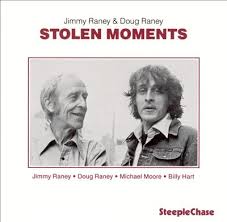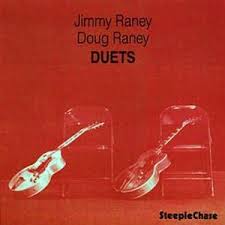The Busy Seventies
page 1 | page 2 | page 3 | page 4 | page 5 | page 6 | page 7 | page 8| page 9
Following “Live in Tokyo,” Jimmy was getting as much calls to work as any other time in his career. Again, alcoholism was a constant specter, but when he was straight, he was much in demand. He worked locally, taught some, and worked clubs in New York like Bradley’s when he got the call (generally a couple of times a year). Charles Mingus was there every night of Jimmy’s gigs at “his” table in front of the piano. Mingus wanted Jimmy for a project, but he avoided it. He respected Mingus, but honestly feared his reputation. In retrospect, it was too bad given how Mingus had mellowed considerably. Collaboration between the two would’ve been great. He also worked the great small club Gregory’s, over in the east 60’s where many guitarists and underappreciated pianists like Hod O’Brien and Don Friedman worked.
When he was in New York, he stayed with fellow guitarist Attila Zoller over in Jackson Heights. In 1977, he went to Europe with Doug, playing in Holland and Denmark. Future Criss Cross record producer, Gerry Teekens, was involved in helping them. As a result of this trip, Doug decided to stay in Europe where he has been since. Jimmy was still under contract with Schlitten’s Xanadu records. A record date was supposed to take place on 1978 with pianist Jimmy Rowles. I was invited to the session. Jimmy fell back into drinking and didn’t show up for the session. The record ended up being Jimmy Rowles’ trio record, We Could Make Such Beautiful Music Together with George Mraz and Leroy Williams. When set to play the tune “Here’s that Rainy Day,” Rowles quipped, “Here’s that Jimmy Raney Day”. Upset, I listened to one take and left.
By 1979, Jimmy found his footing and managed to beat alcoholism until 1982 as I recall (perhaps my memory is foggy but I think this is the case). He was taking the drug, Antabuse, and that seemed to be working for him. For those of you who are unfamiliar with, Antabuse, it causes you to become violently ill if you drink. To alleviate yourself of the effects of the drug, you would need to consciously stop taking the drug for a period of at least a week. During this time, Jimmy was living in New York City with his then girlfriend, artist/poet/therapist, Cyra Greene. Doug was also experiencing success while recording for Steeplechase and his albums with trumpet legend, Chet Baker had just released. We listened to the Doug’s record over at Cyra’s apartment. A friend had called up dad and asked when did he record with Chet. Jimmy had to confess it wasn’t him, but rather Doug. Dad was quite proud of Doug’s achievements on guitar. I also played a little for Dad at Cyra’s apartment on her piano. I was not really that good at that point but still tried my best.
During that time same period, Doug came back to the U.S. He went to Louisville to rehearse for two records on Steeplechase, Stolen Moments and Duets.  They played locally with saxophonist and clinician, Jamey Aebersold. They recorded in NYC. The records, in my opinion were their best efforts together. Stolen Moments the quartet effort, also had on hand, Dad’s favorite bassist, Michael Moore and drummer Billy Hart who had been on Doug’s first two records as a leader. The title track, Oliver Nelson’s “Stolen Moments” and “Jonathan’s Waltz” (named after me) were outstanding tracks and yield great solos from everyone Dad, Doug and Michael. For me they begin to highlight some crucial stylistic departures between Doug and Dad. Doug uses a slightly more amplified and darker tone and displays a great deal of hard bop influence in his approach to double time (typified by Dexter Gordon as well as guitarist, Pat Martino). Dad is using a much more delicate tone on this record and I find it very complimentary. In the liner notes writer, Dan Morgenstern comments on the similarities between them and how if people can’t tell them apart to note that Jimmy is on the right channel and Doug is on the left. Doug is using his prized L7 guitar and Dad his blonde ES 175. For me listening to tunes like “Stolen Moments” and “How My Heart Sings” in this new double guitar format is fascinating after hearing the iconic recordings from Oliver Nelson and Bill Evans. This points to the conviction of their conceptions.
They played locally with saxophonist and clinician, Jamey Aebersold. They recorded in NYC. The records, in my opinion were their best efforts together. Stolen Moments the quartet effort, also had on hand, Dad’s favorite bassist, Michael Moore and drummer Billy Hart who had been on Doug’s first two records as a leader. The title track, Oliver Nelson’s “Stolen Moments” and “Jonathan’s Waltz” (named after me) were outstanding tracks and yield great solos from everyone Dad, Doug and Michael. For me they begin to highlight some crucial stylistic departures between Doug and Dad. Doug uses a slightly more amplified and darker tone and displays a great deal of hard bop influence in his approach to double time (typified by Dexter Gordon as well as guitarist, Pat Martino). Dad is using a much more delicate tone on this record and I find it very complimentary. In the liner notes writer, Dan Morgenstern comments on the similarities between them and how if people can’t tell them apart to note that Jimmy is on the right channel and Doug is on the left. Doug is using his prized L7 guitar and Dad his blonde ES 175. For me listening to tunes like “Stolen Moments” and “How My Heart Sings” in this new double guitar format is fascinating after hearing the iconic recordings from Oliver Nelson and Bill Evans. This points to the conviction of their conceptions.
The duet record from two days later, reveal a certain trait characteristic of father and son: outstanding timing.  Doug’s comping ability minus drums is truly a marvel. You never miss them. This trait is particularly prominent on the trio records with Chet Baker. Aside from the genetic gifts I believe a lot of this accompanying ability was honed from his practicing techniques at home. Doug had a reel to reel tape and would record comping tracks for himself (obviously drum-less) hours and hours of them. You really get a perspective on that when you have to play along with yourself. Dad’s timing is well-known. His comping tracks for his own Duets play-along record for Jamey can almost be set to a metronome. But anyway, the gist of their approach on Duets is that used no-frills approach, no up and down strumming or running bass lines (there is a bit in common with Hall/Evans approach to duets in this regard). One of the things he commented about Doug, is how he always knew what to play behind him, “He (Doug) has this way of subtly pushing me along the way Al Haig did in the old days.” As a side note, Jimmy quipped on the Stolen Moments cover photo (see above) about Doug’s somewhat gruff and wild appearance vs. his own somewhat emaciated look, “Looks like the prisoner and the prisoner of war…”
Doug’s comping ability minus drums is truly a marvel. You never miss them. This trait is particularly prominent on the trio records with Chet Baker. Aside from the genetic gifts I believe a lot of this accompanying ability was honed from his practicing techniques at home. Doug had a reel to reel tape and would record comping tracks for himself (obviously drum-less) hours and hours of them. You really get a perspective on that when you have to play along with yourself. Dad’s timing is well-known. His comping tracks for his own Duets play-along record for Jamey can almost be set to a metronome. But anyway, the gist of their approach on Duets is that used no-frills approach, no up and down strumming or running bass lines (there is a bit in common with Hall/Evans approach to duets in this regard). One of the things he commented about Doug, is how he always knew what to play behind him, “He (Doug) has this way of subtly pushing me along the way Al Haig did in the old days.” As a side note, Jimmy quipped on the Stolen Moments cover photo (see above) about Doug’s somewhat gruff and wild appearance vs. his own somewhat emaciated look, “Looks like the prisoner and the prisoner of war…”
In 1980, for the Newport Festival in Carnegie Hall, there was a Charlie Parker dedication concert, where Jimmy was reunited with his stellar bandmate, Stan Getz. Interestingly, Al Haig (who had some type of feud going on with Stan) refused to share the same stage with Stan so he was put in another configuration. The collection of musicians also included Dexter Gordon, and Dizzy Gillespie, just to name a few. Jimmy and Stan played wonderfully as if no time had passed as I recall. I wish a recording were made of that. Jimmy mentioned that before they went out, amazingly that Stan had asked “Hey do you want to play “Motion” or “Signal?”. Stan hadn’t played the tunes in nearly 30 years. Not even Dad was that confident to just rattle them off. Stan had those kind of musical ears and chops.
To close out the 70s unfortunately, Jimmy’s ear problem was escalating. When Dad did a duo gig with Michael Moore at a club in New York called the Possible 20, he was completely messed up hearing-wise. As noted on prior occasions, nobody seem to know that he was having this problem except Dad and his bandmates.
page 1 | page 2 | page 3 | page 4 | page 5 | page 6 | page 7 | page 8 | page 9
2 Comments
Ebony Helene
Interesting, informative, and detailed biography of your dad, Jimmy. He seemed to be a fun storyteller, though unfortunately with a heavy drinking problem. Thank you for sharing!
jazzmankg
Your welcome. Yes, he was a profound man But the drinking ruined his (and my brother’s) life